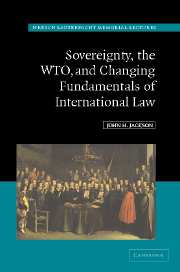Book contents
- Frontmatter
- Contents
- Preface
- Table of statutes and regulations
- Table of cases
- Part I Challenges to fundamental assumptions of international law
- 1 Introduction: international law and international economic law in the interdependent world of the twenty-first century
- 2 The real world impinges on international law: exploring the challenges to the fundamental assumptions of international law and institutions
- 3 Sovereignty-modern: a new approach to an outdated concept
- Part II The WTO
- Part III The search for solutions
- Appendix: Outline of the Uruguay Round treaty establishing the World Trade Organization
- Notes
- Index
2 - The real world impinges on international law: exploring the challenges to the fundamental assumptions of international law and institutions
Published online by Cambridge University Press: 29 March 2011
- Frontmatter
- Contents
- Preface
- Table of statutes and regulations
- Table of cases
- Part I Challenges to fundamental assumptions of international law
- 1 Introduction: international law and international economic law in the interdependent world of the twenty-first century
- 2 The real world impinges on international law: exploring the challenges to the fundamental assumptions of international law and institutions
- 3 Sovereignty-modern: a new approach to an outdated concept
- Part II The WTO
- Part III The search for solutions
- Appendix: Outline of the Uruguay Round treaty establishing the World Trade Organization
- Notes
- Index
Summary
Our post-war institutions were built for an inter-national world, but we now live in a global world.
UN Secretary-General Kofi AnnanIntroduction to exploring the challenges and their impacts on international law
International law, since Grotius at least, has often benefited from a presumption of superiority when it comes to comparisons with other legal systems (regional, national, sub-federal, etc.). Nevertheless, there are many serious criticisms of international law as such, or of certain subparts or types of international law; not all of these criticisms are balanced or even cogent. This phenomenon is not particularly new. Older versions of this criticism have even denied that “international law” is “law” as such, mistakenly using nineteenth-century approaches (cf. John Austin, among others) to a definition of law that is well recognized as not careful or adequately descriptive of real-life effective implications of human measures termed “international law.” The fallacy is even more easily recognized in our contemporary world of “globalized” institutions, such as markets, communications, transport, and weaponry, as was briefly described in Chapter 1. There are vast empirically observable, real impacts on human institutional (governmental, business, academic, etc.) behavior due to norms embraced by the phrase “international law,” even though those norms and their relationships to behavior are much more complex than some of the simple paradigms of legal norm application in national domestic and other legal systems.
- Type
- Chapter
- Information
- Publisher: Cambridge University PressPrint publication year: 2006

